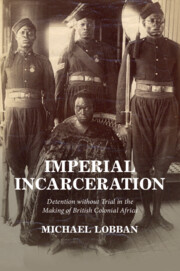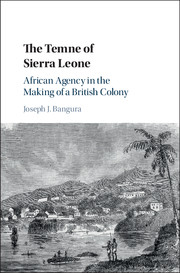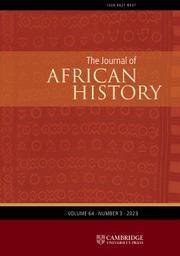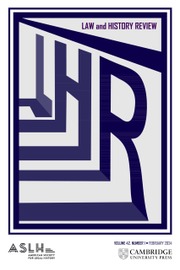Imperial Incarceration
For nineteenth-century Britons, the rule of law stood at the heart of their constitutional culture, and guaranteed the right not to be imprisoned without trial. At the same time, in an expanding empire, the authorities made frequent resort to detention without trial to remove political leaders who stood in the way of imperial expansion. Such conduct raised difficult questions about Britain's commitment to the rule of law. Was it satisfied if the sovereign validated acts of naked power by legislative forms, or could imperial subjects claim the protection of Magna Carta and the common law tradition? In this pathbreaking book, Michael Lobban explores how these matters were debated from the liberal Cape, to the jurisdictional borderlands of West Africa, to the occupied territory of Egypt, and shows how and when the demands of power undermined the rule of law. This title is also available as Open Access on Cambridge Core.
- Demonstrates the importance of legal powers in the expansion of empire
- Combines contextual and archival research to provide a rigorous analysis of the concepts of law
- Uncovers the various interpretations of the law across the British African Empire
Reviews & endorsements
'Michael Lobban has produced an extraordinary work of forensic history-reconstructing a wide range of legal practices spanning the breadth of English dominion throughout Africa over two centuries. His book stands as a 'truth commission' for past wrongs and an essential precursor to any possible reconciliation.' Richard Abel, author of Law's Wars and Law's Trials
'Original and meticulously researched, Lobban's book places the legal politics of detention at the heart of histories of rebellion, protectorates, and martial law. A valuable addition to the legal history of Africa and the British Empire.' Lauren Benton, Barton M. Biggs Professor of History and Professor of Law, Yale University
'Michael Lobban is the leading historian of English legal thought. Here he brings his formidable talents to bear on law's role in facilitating and regulating detention without trial in Britain's African colonies. This is at once an important contribution to history, to legal theory, and to our understanding of empire.' David Dyzenhaus, University Professor of Law and Philosophy, Toronto
'The author of this book deserves credit for producing a work of such ambition and scope.' Thomas Mohr, Irish Jurist
'Recommended.' M. M. Heaton, Choice
'Lobban concludes his readable and comprehensive account of the various regions by clearly emphasizing one overarching element: namely, that the assertion of British power and the elimination of any opposing structures or persons took precedence over compliance with the spirit of the common law and the principles of the rule of law.' Winner Ijeoma, Rechtsgeschichte - Legal History
Product details
August 2021Adobe eBook Reader
9781009020497
0 pages
This ISBN is for an eBook version which is distributed on our behalf by a third party.
Table of Contents
- Acknowledgements
- List of Maps
- Abbreviations of Archival Sources
- 1. Introduction
- 1.1. Habeas Corpus and the Rule of Law
- 1.2. Martial Law 1.3. Legislating for Emergencies
- 1.4. Ad hominem Legislation
- 1.5. Emergency Law in East Africa
- 1.6. From 'Rule of Law' to 'Lawfare'
- 2. Martial Law and the Rule of Law in the Eastern Cape, 1830–1880
- 2.1. Four Wars and Two Rebellions
- 2.2. The Reach of Martial Law
- 2.3. Detention without Trial
- 2.4. Conclusion
- 3. Zulu Political Prisoners, 1872–1897
- 3.1. The Trial and Detention of Langalibalele
- 3.2. Cetshwayo's Capture and Detention
- 3.3. Dinuzulu's Trial and Exile
- 3.4. Conclusion
- 4. Egypt and Sudan, 1882–1887
- 4.1. The Exile of Ahmed Urabi Pasha
- 4.2. The Detention of Al-Zubayr Rahma Mansur
- 5. Detention without Trial in Sierra Leone and the Gold Coast, 1865–1890
- 5.1. The British Presence in West Africa
- 5.2. Detention without Legal Authority
- 5.3. Regularising Detentions
- 5.4. 'Peacekeping' Detentions in Sierra Leone
- 5.5. Political Detentions in the Gold Coast
- 5.6. Conclusion
- 6. Removing Rulers in the Niger Delta, 1887–1897
- 6.1. The British Presence in the Oil Rivers
- 6.2. Jaja of Opobo
- 6.3. Nana Olomu
- 6.4. Ovonramwen
- 6.5. Conclusion
- 7. Consolidating Colonial Rule: Detentions in the Gold Coast and Sierra Leone, 1896–1901
- 7.1. The Deposition of Prempeh of Asante
- 7.2. Sierra Leone's Hut Tax War and the Detention of Bai Bureh
- 7.3. Conclusion
- 8. Detention Comes to Court: African Appeals to the Courts in Whitehall and Westminster, 1895–1922
- 8.1. Sigcau, Sir Henry de Villiers and the Privy Council
- 8.2. Sekgoma Letsholathibe
- 8.3. Saad Zaghlul Pasha
- 8.4. Conclusion
- 9. Martial Law in the Anglo-Boer War, 1899–1902
- 9.1. The First Invasion, October 1899-October 1900
- 9.2. The Second Invasion, October 1900-March 1902
- 9.3. Ending Martial Law
- 9.4. Conclusion
- 10. Martial Law, the Privy Council and the Zulu Rebellion of 1906
- 10.1. Martial Law before the Rebellion, February-March 1906
- 10.2. Martial Law after Bambatha's Uprising, April-September 1906
- 10.3. Natal's Indemnity Act, the Privy Council and the Rule of Law
- 10.4. Tilonko's Deportation
- 10.5. Conclusion
- 11. Conclusion
- Index.







